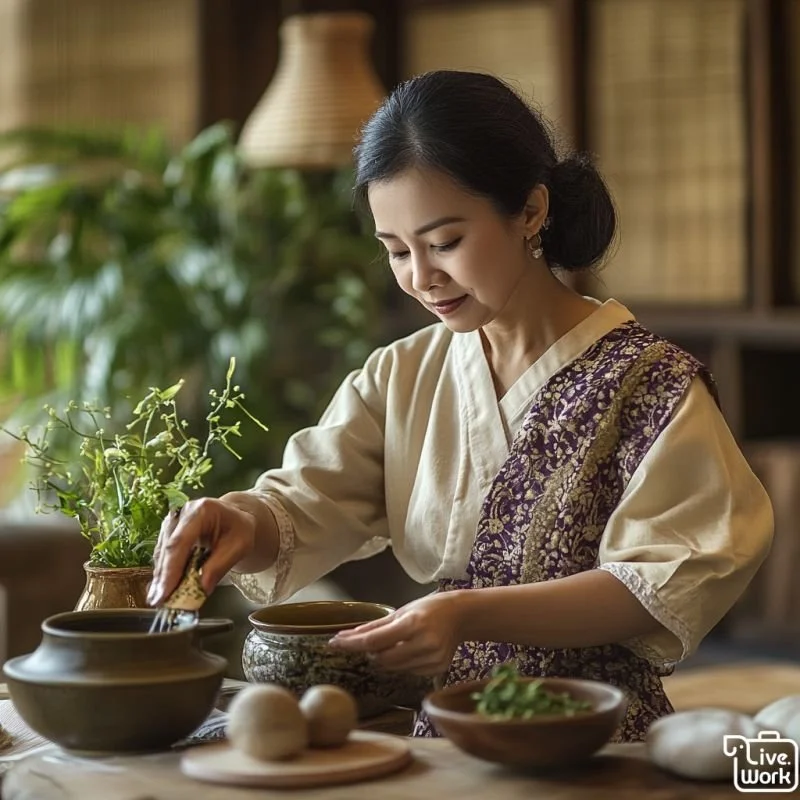Thai Herbal Medicine: Ancient Remedies for Modern Wellness
Long before pharmacies and pills, Thai people turned to the healing power of nature. Passed down through generations, Thai herbal medicine is a vital part of Thailand’s cultural identity and holistic health practices. Drawing from centuries of Buddhist, Ayurvedic, and traditional Chinese influences, this system of medicine uses native herbs, roots, and flowers to treat ailments, restore balance, and enhance well-being.
Today, Thai herbal medicine continues to thrive—not just in rural villages and temples, but also in modern wellness clinics, spas, and households across the country. It offers a natural and accessible approach to health, connecting people to their environment and to centuries-old wisdom.
🌿 What Is Thai Herbal Medicine?
Thai herbal medicine is a holistic healing system that uses the medicinal properties of indigenous plants to treat physical, mental, and emotional imbalances. It’s one of the four branches of Traditional Thai Medicine (TTM), which also includes:
Thai massage (Nuad Boran)
Thai spiritual healing
Thai dietary therapy
Practitioners view the body through the lens of balance and elemental energy (earth, water, wind, fire), and herbal remedies are used to support equilibrium and detoxification.
🍋 Commonly Used Thai Herbs and Their Benefits
Thai herbal medicine makes use of readily available natural ingredients—many of which are also staples in Thai cuisine. Here are some of the most widely used:
| Herb | Benefits |
|---|---|
| Kaffir Lime | Promotes digestion, relieves anxiety, and detoxifies the scalp and skin. Often used in shampoo and herbal compresses. |
| Lemongrass | Antibacterial, anti-inflammatory, and a powerful digestive aid. Frequently brewed as tea or used in steam therapy. |
| Turmeric | Known for anti-inflammatory and antioxidant properties. Supports joint health, liver function, and skin clarity. |
| Galangal | Stimulates circulation, eases nausea, and supports respiratory health. A key ingredient in Thai soups and tonics. |
| Gotu Kola (Bai Bua Bok) | Improves memory, reduces anxiety, and supports skin repair. Used in juices, teas, and topical salves. |
| Plai (Zingiber cassumunar) | Used in massage balms for muscle pain and inflammation. A relative of ginger, common in Thai compresses. |
These herbs are typically consumed as teas, tinctures, powders, balms, compresses, or in traditional dishes, seamlessly blending healing with everyday life.
🧘 How Herbal Medicine Is Used in Thai Wellness Practices
1. Herbal Steam Baths
Herbs like lemongrass, kaffir lime leaves, and turmeric are steamed and inhaled to:
Open the pores
Aid in detoxification
Alleviate respiratory issues
Common in rural homes, temples, and luxury spas, herbal steam rooms are part of post-natal care and general rejuvenation.
2. Thai Herbal Compress (Luk Pra Kob)
Cloth pouches filled with steamed herbs are applied to the body during traditional massage.
Relieves muscle tension
Improves circulation
Enhances lymphatic drainage
Often used after physical labor or intense activity, these compresses are an effective and soothing remedy.
3. Herbal Teas and Tonics
Available in markets, cafes, and homes, these are brewed to address specific concerns like:
Stress and fatigue (e.g., butterfly pea flower tea)
Cold and flu relief (e.g., ginger + honey tea)
Detoxification (e.g., tamarind or bael fruit tea)
🏥 Thai Herbal Medicine in Modern Healthcare
Thailand officially recognizes traditional medicine, and herbal therapies are integrated into public health services, especially in rural areas. Many hospitals and clinics offer:
Herbal consultations
Prescription of Thai herbal capsules
Education on herbal diets and lifestyle
The Thai Ministry of Public Health regulates herbal medicine, and numerous universities now offer degrees in Traditional Thai Medicine, ensuring scientific standards and quality control.
🌏 Why Expats and Wellness Seekers Embrace Thai Herbal Medicine
Accessible and affordable: Most herbs can be purchased fresh, dried, or in supplement form at local markets or pharmacies.
Natural alternative: Ideal for those seeking plant-based solutions to stress, digestion, joint pain, or sleep issues.
Cultural connection: Learning about herbal practices fosters deeper integration into Thai society and respect for its traditions.
Sustainability: Using native herbs promotes eco-friendly wellness practices rooted in biodiversity and traditional farming.
🔎 Tips for Getting Started
Visit a licensed Thai traditional medicine clinic for personalized advice.
Try herbal teas from reputable vendors at local markets.
Incorporate fresh herbs into your cooking—Thai cuisine is naturally medicinal!
Attend a Thai herbal workshop or retreat for hands-on experience.
Check for interactions if you’re already on medication—consult both a Thai and Western practitioner if needed.
Final Thoughts: Healing Through Nature, the Thai Way
Thai herbal medicine is more than ancient knowledge—it’s a vibrant, evolving system of health that continues to empower and heal. By embracing this tradition, you’re not just treating symptoms; you’re nurturing balance, respecting nature, and participating in a centuries-old relationship between people and plants.
